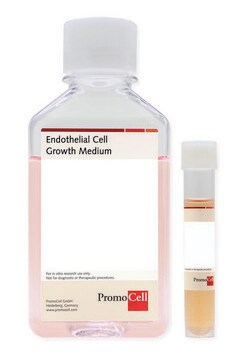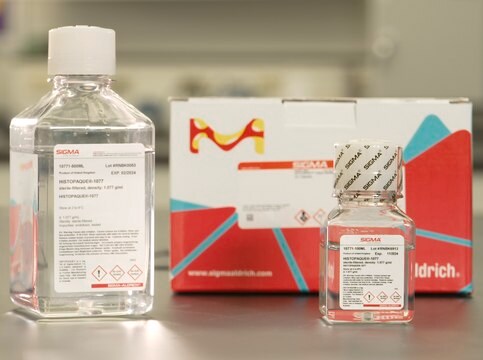300-05A
Human Coronary Artery Endothelial Cells: HCAEC, adult
Sinonimo/i:
HCAEC cells
About This Item
Prodotti consigliati
Origine biologica
human coronary artery (normal)
Livello qualitativo
Confezionamento
pkg of 500,000 cells
Produttore/marchio commerciale
Cell Applications, Inc
Modalità di accrescimento
Adherent
Cariotipo
2n = 46
Morfologia
Endothelial
tecniche
cell culture | mammalian: suitable
Malattie correlate
cardiovascular diseases
Condizioni di spedizione
dry ice
Temperatura di conservazione
−196°C
Descrizione generale
HCAEC provides an excellent model system to study all aspects of cardiovascular function and disease, and they have been utilized in dozens of research publications, for example to:
- Understand the mechanism of the anti-inflammatory properties of HDL, and demonstrate for the first time that mature miRNA can control gene expression in a cell where it is neither transcribed nor processed (Tabet, 2014)
- Study mechanisms of angiogenesis, as well as oxidative stress and inflammation related pathways in endothelia (Ji, 2009; Wang, 2011; Quinn, 2011; Hung, 2010; Rajesh, 2010; Riegel, 2011; Lin, 2013; Lloid, 2013Baley-Downs, 2012; Kapur, 2012; Melchior, 2012; Castanares-Zapatero, 2013; Hankins, 2013; Lord, 2013; dela Paz, 2013; Takai, 2013), including gender and race specific differences in patients with peripheral artery disease (Gardner, 2014)
- Elucidate molecular mechanisms of various cardiovascular risk factors, including those associated with diabetes (Vladik, 2011; Kapur, 2011; Dunn, 2013; Leucker, 2013; Liu, 2013, 2014; Morgan, 2014; Torella, 2014)
- Understand the mode of action and cardiovascular protection effects of various natural compounds, vitamins and drug candidates (Candelario, 2013; Ramirez-Sanchez, 2010, 2013; Lee, 2013; Nsimba, 2013; Di Bartolo, 2011; Baotic, 2013; Murphy, 2013; Tan, 2013; Wu, 2012), as well as caloric restriction (Csiszar, 2009, 2013)
- Develop and evaluate scaffolds and hydrogels for cardiac tissue engineering (Singelyn, 2009, 2011; Seif-Naraghi, 2010; Johnson, 2014), and new treatment strategies to prevent stent restenosis (O’Neill, 2009; O’Brien, 2010; Crowder, 2011, 2012; Eppihimer, 2013; Hiob, 2013)
- Compare effects of BMP-4 on HCAEC and Human Pulmonary Artery Endothelial Cells (HPAEC) and show that only in HCAEC BMP-4 treatment induced ROS, activated NF-kB, ICAM-1 and increased monocyte adhesiveness, explaining why its upregulation leads to atherosclerosis and hypertension in the systemic, but not pulmonary circulation (Csiszar, 2008)
Additionally, HCAEC, along with human aortic (HAOEC), carotid artery (HCtAEC), subclavian artery (HScAEC) and brachiocephalic artery (HBcAEC) have been used to demonstrate that not only blood vessels from different tissues are highly heterogeneous, they also interact differently with leukocytes during the inflammation response (Scott, 2013). The authors further showed that differential N-glycosylation of commonly expressed vascular adhesion molecules may be responsible for this heterogeneity, as well as for modulation of signaling under resting and activated inflammatory conditions. This also explains why specific vascular beds may be more or less susceptible to particular diseases or stimuli. Importantly, if cells from different sources were used, these results could not be convincingly validated due to a number of uncontrolled variables, such as age, race, genetic variability or life style choices of the donors.
Because of the complex heterogeneity that exists not only between different donors, but even between different vascular beds in the same individual, it would be prudent to confirm any new findings on primary cell lots coming from several different origins.
Origine della linea cellulare
Applicazioni
Componenti
Nota sulla preparazione
- 2nd passage, >500,000 cells in Basal Medium containing 10% FBS & 10% DMSO
- Can be cultured at least 15 doublings
Mantenimento delle subcolture
Esclusione di responsabilità
Codice della classe di stoccaggio
10 - Combustible liquids
Classe di pericolosità dell'acqua (WGK)
WGK 3
Punto d’infiammabilità (°F)
Not applicable
Punto d’infiammabilità (°C)
Not applicable
Elenchi normativi
Forniamo informazioni su eventuali restrizioni prevalentemente per i prodotti chimici. Per altre tipologie di prodotto siamo in grado di fornire soltanto informazioni limitate. Nessuna segnalazione significa che nessuno dei componenti è citato in un elenco. È dovere dell’utilizzatore assicurarsi che il prodotto venga impiegato in maniera sicura e a norme di legge.
EU REACH Annex XVII (Restriction List)
Scegli una delle versioni più recenti:
Certificati d'analisi (COA)
It looks like we've run into a problem, but you can still download Certificates of Analysis from our Documenti section.
Se ti serve aiuto, non esitare a contattarci Servizio Clienti
Possiedi già questo prodotto?
I documenti relativi ai prodotti acquistati recentemente sono disponibili nell’Archivio dei documenti.
Protocolli
Store the cryovials in a liquid nitrogen storage tank immediately upon arrival.
Il team dei nostri ricercatori vanta grande esperienza in tutte le aree della ricerca quali Life Science, scienza dei materiali, sintesi chimica, cromatografia, discipline analitiche, ecc..
Contatta l'Assistenza Tecnica.




